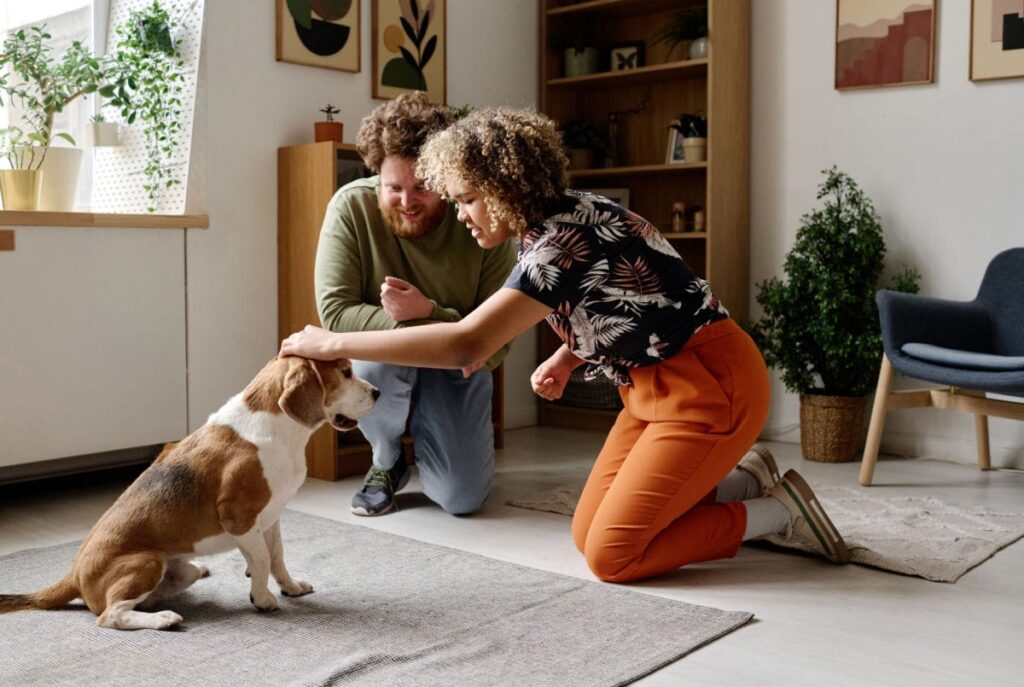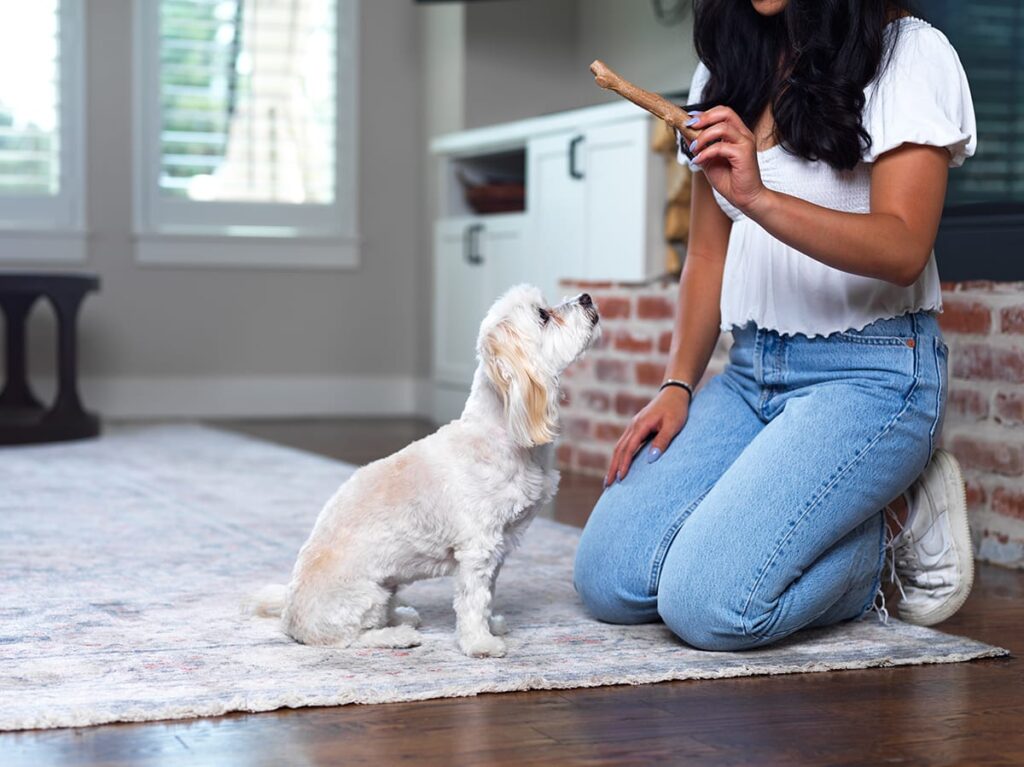Are you overwhelmed or frustrated with how your dog acts? You aren’t alone. It’s always ok to reach out to canine experts for help!
When you brought a dog home you probably had a clear idea about what life with your new best friend was going to be like. Maybe you pictured walks in the park, your dog romping on a beach off-leash, bringing your dog with you to cafes, or lounging next to all your friends at your next house party.
Some dogs excel in these sorts of situations, but for many dogs, this is not something they are automatically comfortable with.
For other dog owners, the difficulties they are having are closer to home like separation anxiety, stranger danger, and/or resource guarding.
Every Age Has Challenges

Dogs and puppies of all ages are a lot of work and come with their own unique challenges. For young puppies, the whole world is a new experience to be explored. Puppies are taking in information about people, other dogs, and environmental factors that they will carry throughout their entire life.
Adult dogs, on the other hand, have a lifetime of experiences both positive and negative to contend with that will inform much of their behavior now and in the future.
It’s often suggested that adopting an adult dog is easier than bringing home a puppy. In some ways, this might be true in that some (though not all) adult dogs may, for example, know some basic cues like sit or down or are potty trained. However, that doesn’t mean it’s easy to adopt an older dog.
It can take weeks, if not months for a dog to decompress in a new home no matter its age. During this time your dog is learning about you, your home, and routines, and they are learning about themselves. This is also when the dog’s personality will come out. That may mean the subdued quiet dog you thought you were adopting finds its true personality and could be a lot more active than you realized.
Even if you have had many dogs before there is no shame in discovering you are sharing your life with a dog you aren’t sure how to best support or communicate with.
If you find yourself with a new dog or puppy and are feeling overwhelmed it’s ok to ask for support! Signing up for basic obedience or puppy kindergarten class with your new family member is a great way to develop a shared bond around learning. It’s also an excellent way to form a relationship with a trainer who can be a resource and support for you and your dog when challenges arise in the future.
Don’t Wait To Ask For Help

One key mistake dog owners make is feeling like they must wait for things to get “really bad” before getting professional help. It’s never too early to get support with training and understanding your dog.
In fact, the earlier you start working with your dog the easier the training process will ultimately be because it won’t have as many opportunities to rehearse behavior we don’t like or want.
Each dog is an individual. Even if you have had many dogs before there is no shame in discovering you are sharing your life with a dog you aren’t sure how to best support or communicate with. Even dog professionals benefit from working with and collaborating with other trainers and canine behavior experts.
Finding A Dog Trainer

If you’re struggling with your dog’s behavior the best first step is to seek out professional support. This will help both you and your dog to communicate better with one another and can give you the tools needed to better understand your dog.
Dog training in the United States is a completely unregulated industry. This means that anyone can call themselves a dog trainer regardless of how much experience they have, or what methods they use, and if those methods are documented to be effective or humane.
When seeking a trainer to work with you and your dog, check references and ask what their specialty is. Seek out a trainer with experience working with dogs struggling with the same behaviors you are working through.
Most importantly, find a trainer who is centering positive reinforcement and LIMA (Least Invasive, Minimally Aversive) approaches.
You’ll also want to avoid trainers who use language like “alpha” or “balanced” to describe how they work with dogs as these outdated techniques can harm your dog or exacerbate the challenging behaviors you are experiencing.
Using training methods that rely on aversive techniques like pain-causing tools (shock collars and prong collars), or intimidation practices like alpha rolls, only suppress your dog’s feelings temporarily.
Not only are these techniques stressful and upsetting for dogs, but they also don’t change the underlying emotions that lead to challenging behaviors (often fear). This means these behaviors are likely to return and worsen.
The Certification Council for Professional Dog Trainers has a reputable database on their website for finding a trainer near you who utilizes positive reinforcement approaches.
Getting Veterinary Support

If you are struggling with behavior in your dog, call your vet. Your veterinarian will be able to do a thorough exam to determine if there are any underlying health conditions, pain points, or other health-related reasons why your dog might be struggling.
If your dog is reluctant to do something or stops following cues it may be because they are in pain. Dogs who are in pain may be reluctant to perform basic behaviors like sit or down on cue because it is painful for them to do so. Similarly, a dog who is experiencing pain may be more irritable or have a change in temperament.
If you have a dog who is distressed and struggling, you, your trainer, and your veterinarian may decide that fast-acting, as-needed anti-anxiety medication could benefit your dog around triggering events like vet visits, thunderstorms, or fireworks.
Just like there has been a push in recent years to destigmatize conversations around mental health for people, the same needs to be true for our dogs. Some dogs need chemical support for a period to help them reach a mentally healthy place where they can participate in training.
Depending on the challenge you and your dog are facing, your veterinarian may also refer you out to a veterinary behaviorist to work with you, your vet, and your trainer on a wraparound treatment plan for your dog.
Finding A Support Network

Having a dog isn’t always easy! Dogs are autonomous beings and sometimes they do things that you don’t like, don’t understand, or just find challenging. You love your dog so it’s only natural that if you are feeling like there are challenges in your relationship you will feel upset, overwhelmed, or even hopeless.
There is no shame in feeling this way. In fact, it’s a sign that you love your dog very much and just want what is best for them.
Try not to let these feelings of being overwhelmed fester, as this can become a toxic cycle that can leave you and your dog feeling even further apart. If you find yourself feeling overwhelmed this is a great time to look for help and support before that grows and you begin to resent your dog.
Finding other dog owners who are dealing with similar struggles can help you not feel alone. If you don’t have other dog parent friends near, social media groups (for your breed, mixed breed, or groups around the specific health or behavioral challenge of your dog) can be an accessible way to find other dog owners who are having similar challenges. Just knowing that other people and dogs are having the same issues can help you to feel less overwhelmed.
That said, remember that these groups are not professional support. These groups can be emotionally beneficial for dog owners, but you don’t want to take training or vet advice from unqualified strangers online.
It’s Never Too Late To Get Help
The saying ‘you can’t teach an old dog new tricks is one of the biggest myths when it comes to dogs. You absolutely can and should continue to teach your dog new skills and behaviors over the course of their life.
Behaviors that have been rehearsed consistently are more likely to be repeated. This means if your dog has repeatedly done something like lunge and bark at other dogs it may take longer to help your dog learn a new response to seeing dogs. That said it’s very possible to help older dogs learn new reactions and responses to situations.
As frustrating as your dog’s behavior might be, try to remember that it’s coming from a place of emotional overload.
Your dog isn’t being difficult, your dog is struggling and communicating its big feelings in the only way that they know how.
Putting The Work In

Although dogs are highly intelligent, they don’t come pre-programmed to understand human language or the norms and expectations of our homes. This sounds basic but it can lead to a lot of frustration and challenges for dogs and people.
If you find your dog isn’t doing what you are asking them to do, and you are struggling to communicate in a way your dog understands, it’s a good idea to bring in a translator (aka a trainer)! A dog trainer will be able to help you learn how to translate your wants and desires into skills that together you can teach your dog. This can reduce the frustration you both are experiencing.
The stigma of having a challenging or difficult dog can be enough to keep some dog guardians from asking for support. Unfortunately, this generally only exacerbates the challenges they are experiencing with their dogs. There is no shame in needing support to work with your dog.
You may never have the fantasy dog that you thought you wanted. If you need to mourn the “loss” of the kind of dog you thought you would have, then refocus on the wagging tail and wet nose at your side.
You and your dog are together for a reason, even if the relationship you have looks different or more challenging than you thought it would be to have a dog.

